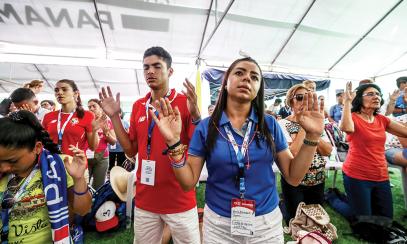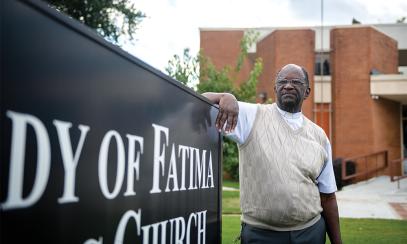
Called to Something More
Welcoming Young Adults Into the Parish Community
Welcoming Young Adults Into the Parish Community
Society and economics have changed dramatically in the last 50 to 75 years, prompting the rise of this new demographic that has developed a unique cultural identity: the young adult. In 1996, the United States Conference of Catholic Bishops (USCCB) published “Sons and Daughters of the Light,” an excellent guide that includes a useful set of goals and practices for establishing a successful apostolate to young adults. It proposes, among other things, that a parish needs to invite young adults into its activities, but also find new ways of connecting the community to them. The parish must help them discern their place in our Church, and the world. We must also look after their spiritual needs, beyond providing opportunities for social connection.
Society and economics have changed dramatically in the last 50 to 75 years, prompting the rise of this new demographic that has developed a unique cultural identity: the young adult. In 1996, the United States Conference of Catholic Bishops (USCCB) published “Sons and Daughters of the Light,” an excellent guide that includes a useful set of goals and practices for establishing a successful apostolate to young adults. It proposes, among other things, that a parish needs to invite young adults into its activities, but also find new ways of connecting the community to them. The parish must help them discern their place in our Church, and the world. We must also look after their spiritual needs, beyond providing opportunities for social connection.
Young adults are those who have only recently begun to experience what is referred to in philosophical terms as being a “sovereign person,” someone who rules over their own self and their own freedoms. Young adult ministry is typically regarded as serving 18- to 35-year-olds, covering various stages and states of life. Within this group are college students, high school graduates who choose not to go to college, graduate students, young professionals, single people, married couples, as well as married and single parents. In addition, the ethnic, racial, and economic diversity in this age range is very wide.
Archbishop Charles Chaput, echoing the mid-20th century philosopher Hannah Arendt, has written and spoken often about the issue of how our modern society preserves personal freedom and independence, but at a cost. We now suffer isolation from others, which results in deep loneliness, even when surrounded by people. Migration and shifting job markets leave young people without the experience of a generational sense of belonging to a homeland, without deep roots to a people or a place. Secular social commentators such as Drs. Jordan B. Peterson and John Vervaeke have identified a modern crisis of meaning, and Bishop Robert Barron has been an outspoken voice for how this meaninglessness has affected young people. How can we, as a diocese or a parish community, reach out and draw in such a diverse group, helping them navigate these storms of loneliness, rootlessness, and meaninglessness?
Sometimes, young adults have access to nearby parish get-togethers with their peers. Typically, these take the form of a Bible study, prayer group, or social. These successes bring struggles in that the methods focus on an environment where young adults are segregated from the parish by their age and state of life. They do not necessarily provide a forum for formation in family life or support in whatever vocational life comes next. Many parishes continue an existing habit of inviting young adults to join organizations and ministries. While it is necessary to make them welcome at what already exists in parish life, older parishioners already occupy and enjoy these areas, which can be challenging and intimidating for young adults wanting to find a way to fit in.
The Church is calling us to something more. And the situation demands we do more.
Pope Francis has consistently encouraged young adults not to be afraid to marry and start a family, but he also notes that economic and social support is lacking and causing young adults to postpone their vocations. We need to take responsibility for building parish cultures that can provide this support. In the apostolic exhortation Christos Visit, His Holiness asks us to question and change our habits, our ways of being together. We need to carve out time and space in order to make room for our young adults to discern, to find, and to build their own ways of being together with us. We must participate in new ways of living together with them, embracing their vocations as adult members of our parish communities.
Placing a young adult on the parish council or finance council could be a good start. Yielding responsibility for planning and executing an important feature of an event like a parish festival, even if it means giving up how it has always been done, would be another step. But most of all, communicating personally with any young adult in the parish about where they are in their faith and life journeys and asking them what we could do to support them is worth more than a token responsibility. Being an older friend, a mentor, a sounding board and helping them discern what to do next in life is possibly the best gift any of us could give.
The Church’s outreach should not be merely a social network of peers, a faith-based source for the same kinds of superficial connections that modern culture offers. What is necessary is a true sense of belonging, found in the knowledge that one is a member of the Mystical Body of Christ, meaningfully participating in the common life in Christ that only the Church can provide.
Alex Kubik is the Diocese of Birmingham's Director of Discipleship and Mission.



